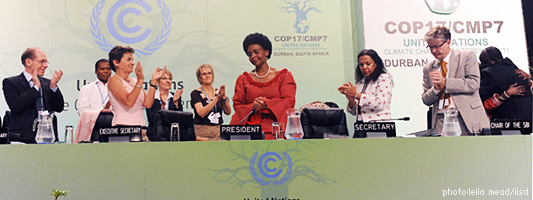

 0 Comment(s)
0 Comment(s) Print
Print E-mail China.org.cn, November 20, 2014
E-mail China.org.cn, November 20, 2014
 |
Turning point in the negotiations
The UN Climate Change Conference in Durban was a turning point in the climate change negotiations. In Durban, governments clearly recognized the need to draw up the blueprint for a fresh universal, legal agreement to deal with climate change beyond 2020, where all will play their part to the best of their ability and all will be able to reap the benefits of success together.
In short, all governments committed in Durban to a comprehensive plan that would come closer over time to delivering the ultimate objective of the Climate Change Convention: to stabilize greenhouse gas concentrations in the atmosphere at a level that will prevent our dangerous interference with the climate system and at the same time will preserve the right to sustainable development.
The challenge, then and now, is to push climate action forward as rapidly as possible, both inside and outside the climate change negotiations. The reality is that a looming gap remains between current national and international actions and intentions to reduce emissions and the actual level required to keep average global temperatures rising no more than two degrees above their pre-industrial level, above which science shows that there is a much higher risk of very serious climate impacts.
Moreover, even if the two-degree scenario is met, developing countries, especially the poorest and most vulnerable, will still need much more support to adapt to the change that is already embedded in the global climate system.
Road map for implementation
The Durban outcomes looked to address these challenges in a more connected way by embodying a pdf-icon road map for implementation over a longer time horizon than has commonly been the case in the history of the Convention. On this map, four main areas of coordinated and complementary action and implementation, designed also to build and preserve trust among countries, were agreed:
1) Second commitment period of the Kyoto Protocol
? The continuation of the current international legal system through a second commitment period of the Kyoto Protocol, under which developed countries commit to greenhouse gas cuts and which enshrines existing accounting rules and models of international cooperation that may inform future efforts.
2) Launch of new platform of negotiations
? The launch of a new platform of negotiations under the Convention to deliver a new and universal greenhouse gas reduction protocol, legal instrument or other outcome with legal force by 2015 for the period beyond 2020. This new negotiation critically includes finding ways to further raise the existing level of national and international action and stated ambition to bring greenhouse gas emissions down.
3) Conclusion in 2012 of existing broad-based stream of negotiations
? A decision to conclude within 2012 the work of the existing broad-based stream of negotiations that includes all member nations under the Convention. This includes work to make existing national emission reduction or emission limitation plans more transparent. It also encompasses the launch and long-term implementation of the comprehensive global support network that will deliver funding and technology to help developing countries build their own clean energy futures and construct societies and economies which are resilient to climate change.
4) Global Review
? To scope out and then conduct a fresh global pdf-icon Review of the emerging climate challenge, based on the best available science and data, first to ensure whether a maximum two-degree rise is enough or whether an even lower 1.5 degree rise is required, and then to ensure that collective action is adequate to prevent the average global temperature rising beyond the agreed limit.
The need for greater ambition
It remains crucial that all levels of government - national, sub-national and local - take the bigger and bolder action that is required to keep the world on the right track to reduce emissions, to deal with existing climate change and to help smooth the way for an effective new global climate change agreement in 2015.
Similarly, it will be critical for the business and technology sectors and for civil society to profit rapidly from the increasing number of opportunities being presented by the national and international climate response, while building environmentally sustainable and resilient societies worldwide.
The Durban outcome recognized, in its spirit and intention, that smart government policy, smart business investment, and the demands of an informed citizenry, all motivated by an understanding of mutual self-interest, must go hand in hand in pursuit of the common goal.